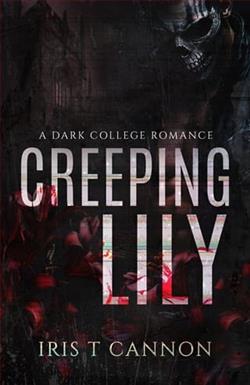Page 41 of Jailer to the Death God
Besides their eager smiles, all these men have silvery-white hair. The national sign of survival. They were stricken by the plague, and they lived through it.
For a moment longer I stand, surveying them. Distantly I perceive my own reflection in the polished gold mirrors lining the walls of the ballroom—mirrors intended to make the space feel larger. Mirrors selected, I was once told, by my grandmother, who had a taste for grandeur and a fondness for admiring her own figure.
At this distance, my figure is a slim smudge of green and white. I’m wearing a heavy forest-green overdress with gold swirls of embroidery, belted over a simple cranberry-colored dress. A pair of my grandmother’s huge, ornate earrings frame my face, contrasting with my pale hair. It’s traditional winter-festival garb—Tilda’s suggestion. Maybe she thought it would cheer me up.
It hasn’t.
I’ve been standing here too long, staring and thinking for too long. The smiles of the men around me are beginning to falter—they’re casting uncertain glances at each other.
After the whirl and bustle of today, I am an echoing void inside. But I must paint on a smile and try to exude a regal warmth. I must attempt to be charming. I must keep in mind the qualities I need from a husband.
“Thank you all for coming,” I tell them, with what I hope is a gracious smile. “I would love to speak with as many of you as I can this evening, so I crave your patience as I spend a little time with everyone. In the meantime, please enjoy yourselves. Eat, drink, and dance!”
As I lift my hand, a quartet of musicians in the corner begins a lilting tune. The Chief Manager suggested inviting a number of single noblewomen to the event as well, so the consort candidates will have partners to dance and chat with while I’m otherwise occupied. Those women step forward as the music swells, and I exhale with relief as some of the male guests bow and invite the ladies to dance.
But a few of the men approach me, smiling with all their teeth, their voices honeyed and charming. I exchange a few words with them and move past the group, toward a young man who is standing alone, looking rather awkward. I pluck his name out of my memories—Lord Erving. A classmate of Lei, Rose, and I. He was friends with Otin Venniroth for a while, but they have since parted ways—a mark in Erving’s favor.
“Lord Erving.”
He startles when I address him, his blue eyes flaring wide, cheeks flushing. “Your Majesty.”
His blush eases my own nerves, and I give him a real smile. “Would you care to escort me to the food? I’m famished.”
“Of course! My pleasure. I mean, my honor. Most gratified, I’m sure.” He crooks his elbow, and I slip my arm through it.
He escorts me to one of the tables. It’s laden with copper pots and individual cups of steaming tea, smelling of mint and honey.
Mint tea.
Of all the possible flavors—mint tea.
I understand why the cook prepared this for our scanty feast. Mint is a hardy plant, and plentiful.
But Rose loved mint tea.
Rose, my Rose…
I try to adjust my thoughts, try to channel the scent into warm memories of her, but I can’t, I can’t—the smell coils in my throat, clogs it with sudden nausea.
“No tea,” I tell Lord Erving abruptly, and I pull him along the table, away from the copper pots…
Only to encounter cinnamon cakes sprinkled with brown sugar.
Brown sugar, brown sugar…
Leilani used to put brown sugar in everything, on everything. Apples, pears, bread, pudding, even roast beef.
I suck in a ragged breath, the space behind my eyes swelling with the pressure of unshed tears.
It’s as if pieces of my friends have been chopped apart and laid out on the table.
Mint tea and brown sugar.
I am coming apart. I’m unraveling. I can’t unravel, not here, not here…
“Music,” I say desperately. “Do you like to dance?”
Lord Erving stares at me, rightfully confused, poor man. “I…well, I…”















